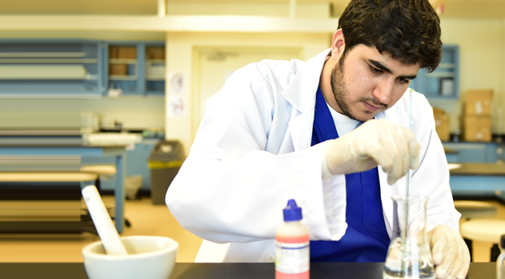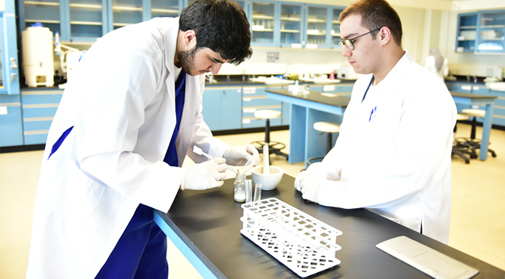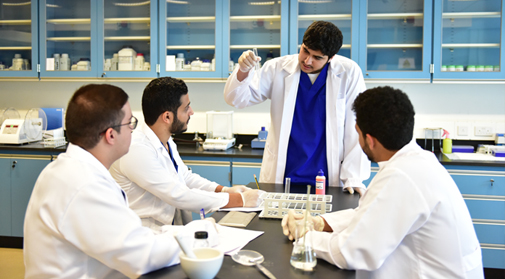Student Research
UNDERGRADUATE RESEARCH PROGRAM
Developing and maintaining undergraduate research programs benefits students, faculty mentors, and the university. A key aspect of the Pharm D curriculum at the College of Pharmacy of Alfaisal University is undertaking experimental, epidemiological or clinical research to foster competitive research skills in our students during their undergraduate training. Incorporating a research activity along with a sound academic foundation enhances students’ independent critical thinking skills, develops their oral and written communication skills and increases their visibility in the scientific community. The current structure of our research process positively impacts valuable learning objectives and thus will have a long lasting influence on the anticipated pharmacy-related professional services after graduating the program.
During the research training year, which is currently offered during the fifth year of the program (Semesters 9 and 10), pharmacy students can seek the opportunity to work in research projects across a range of health-related disciplines by working closely with a faculty member supervising a relevant project. Students are guided throughout the research program and taught how to apply research knowledge, show independence, and think creatively and critically about the collected research data. The program is also expected to develop the student’s leadership qualities, time management skills, team work, and ability to multitask and meet project deadlines.
Students are also encouraged to participate in various scientific forums including, but not limited to, the university annual poster completion, local scientific conferences and international research meetings. This is a critical aspect of research training in which students learn to share their knowledge with the broader community and receive feedback on their work.
RESEARCH PROGRAM GOALS
Our current research program is designed to teach the following:
- The general framework of designing a scientific research project
- How to write a research proposal and the required ethical standards to undertake research
- How to assess, analyze and contextualize collected research data
- How to confidently communicate research via both verbal and written communications
- How to appraise research literature in terms of novelty, significance and impact
- How to draft an original manuscript to be submitted for publication in a peer-reviewed journal
RESEARCH PROGRAM ASSESSMENT
Throughout the research training year, students are assessed and marked against each item described in the table below:
| No | Assessment items | Timeline | Marks out of 100% |
|---|---|---|---|
| 1 | Workshop attendance | Week 1–3 (Semester 9) | 5% |
| 2 | Paper appraisal | Week 4 (Semester 9) | 5% |
| 3 | Research proposal writing, and ethics committee submission | Week 4–5 (Semester 9) | 20% |
| 4 | Research proposal presentation | Week 6 (Semester 9) | 5% |
| 5 | Research progress report | Week 7–8 (Semester 10) | 5% |
| 6 | Supervisor’s student evaluation | Week 14–15 (Semester 10) | 10% |
| 7 | Final project report | Week 14–15 (Semester 10) | 30% |
| 8 | Final project presentation | Week 14–15 (Semester 10) | 20% |
- Research project workshop series: These workshops are designed to cover 3 major research-related topics that would provide students with the fundamentals required to carry out a research project successfully during their fifth year of the program. The topics are given at the beginning of the fall semester (Semester 9) over 3 consecutive weeks.
- Workshop 1 “How to write a scientific research proposal”: During this workshop, the students are instructed on key components of a research proposal (e.g., general layout, structure and formatting and writing tips) and how to draft up their own.
- Workshop 2 “Conducting and analyzing a scientific research project”: During this workshop, students are talked through general research design, potential research types, data sampling and data analysis.
- Workshop 3 “How to write a scientific research paper”: During this workshop, students are taught how to present their research findings in an original research paper format ready to submit for publications.
- Paper appraisal test: This is a test where students are presented samples of well-written and poorly-written papers and given the opportunity to critically assess those samples based on the knowledge they have acquired from the workshops.
- Research proposal writing: Students may select their faculty supervisors or vice versa based on mutual interest. Alternatively, the college can provide the students with a list of potential supervisors and research projects based on the number of enrolled students. Following discussions between students and supervisors, a research topic for each student group is decided and students are asked to draft up a research proposal. Students are then marked on their proposal and asked to deliver an oral presentation to their peers on their proposed research plan.
- Research progress report: Once data collection is commenced, students are strongly encouraged to organize week-to-week meetings with their supervisors to ensure that work progress is on track. Students are also encouraged to draw on their supervisor’s experience in the field and learn how to analyze, assess, graph and present their research data. Half way through the research program and once students have collected some preliminary research data, all students are required to present their progress in a report to be corrected and marked by their supervisors.
- Supervisor’s student evaluation: Towards the end of the program and closer to submitting the final version of the project report, all research supervisors are asked to critically evaluate their students and comment on their performance throughout the course of the research program. Supervisor’s report will also contribute toward the student’s final mark on this course.
- Final project report: Once data collection is complete, students are required to submit a final report on their project. Prior to submission deadline, students are again expected to work closely with their supervisors and receive some input on their writing, results contextualization and discussion and overall document format and presentation. The final report is then reviewed, assessed and marked independently by a dedicated panel created solely for this evaluation. Final project report and marking form are given as samples.
- Final project presentation: Students are given the opportunity to present their research project at this stage, and verbally share both their research findings and overall experience with an audience from the university. Students are then assessed by panel members in terms of their overall comprehension of the pressing research issue(s) they are presenting, knowledge and understanding of their research outcomes and their ability to defend their findings and identify pathways for future research.




